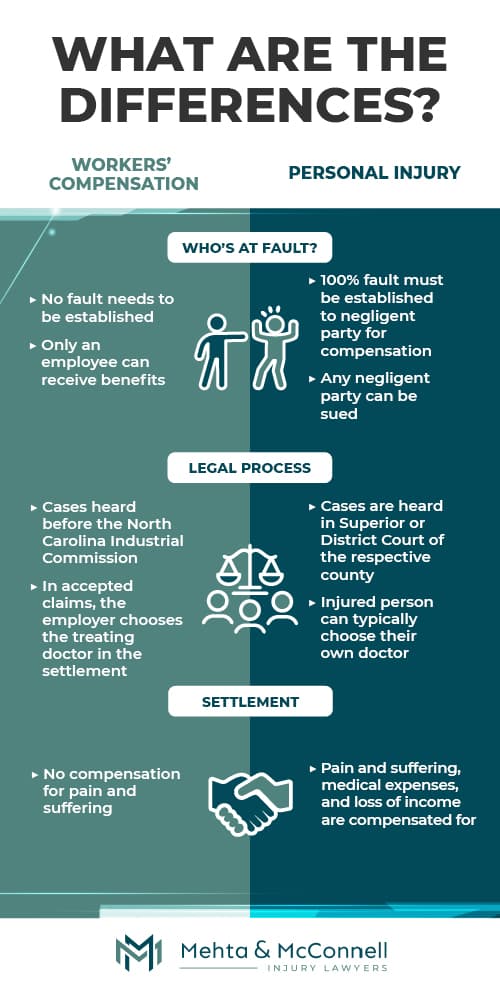
Back injuries suffered while at work can be devastating.
They may cause you to be out of work for a considerable amount of time, require surgery, and prevent you from returning to your prior profession at all.
Understandably, many prospective clients want to know what they can get for a worker-related back injury.
As every claim is different, you need to speak with an experienced North Carolina workplace injury lawyer at Mehta & McConnell to find out what your case is potentially worth.
Contact our workers’ compensation lawyers today to schedule a free consultation.
Common Work-Related Back Injuries
North Carolina workers hurt their backs all the time. Usually, the more physical the labor, the more risk of a back injury.
Work-related back injuries can be caused by lifting heavy objects, constant twisting, sudden falls, car or truck accidents, and other physical injuries.
Here are the common types of back injuries we see at our North Carolina workers’ comp law firm that are associated with workers comp settlement back injury claims:
- Pulled muscles;
- Herniated discs;
- Bulging discs;
- Fractured vertebrae;
- Damaged, bruised, or severed spinal cord;
- Paraplegia; and
- Quadriplegia.
Most of these specific injuries can easily prevent someone from performing their normal work activities. If so, then that worker is entitled to wage and medical benefits.
Average Settlement for Workers’ Comp Back Injury
Most workers’ comp claims are fairly simple. The employee gets hurt, is out of work for a while, gets treatment, and returns to work.
These simple claims often take care of themselves without the need for lawyers.
Workers’ comp claims involving serious back injuries are more complicated. These are the claims where you want to discuss what the average settlement for workers’ comp back Injury is.
Unfortunately, there is no set formula that you can use to come up with an average settlement for back injury claim. Every case is different, and a settlement will depend upon many factors.
According to the Occupational Safety and Health Administration (OSHA), the average settlement for a workers’ compensation claim related to a back injury can vary significantly based on several factors. In general, settlements for back injuries can range from $40,000 to $80,000, but it’s essential to understand that individual cases may differ substantially. Settlement amounts depend on the severity of the injury, medical expenses, lost wages, and other specific circumstances. Therefore, it is recommended to consult with a legal professional to get a more accurate assessment of your specific case’s potential settlement amount.
If your injury keeps you from work for a period of time, you receive temporary total disability (TTD) wage benefits.
TTD benefits pay up to 66% of your regular pre-tax salary while you are unable to work.
If it turns out that your back injury will be permanent in nature, then your claim may turn into a permanent partial disability (PPD) case.
Under PPD claims, your doctor will place a permanent percentage of loss on the body part involved. For example, your doctor may say that your back injury caused a 15% permanent loss of use of your spine.
Under North Carolina workers’ comp law, a schedule lists the number of weeks of TTD you get for certain percentages of permanent disability.
Section 97-31 lists the amount of benefits you would receive based upon the loss of use of various body parts. For the total loss of the back, the law allows for 300 weeks of TTD.
Therefore, if your doctor rates your back injury as 15% permanent disability, then you’re paid 15% of 300 weeks (45 weeks) of your TTD weekly wage rate.
Before you accept a PPD rating, it is important that you discuss your case in detail with an experienced workers’ comp lawyer.
How to Prove a Work-Related Back Injury in North Carolina
The first step in a North Carolina workers’ compensation back injury claim is to prove that your injuries occurred at work.

Back injuries at work include those caused by an “accident” as well as those caused only by a specific traumatic event at work.
Unless your injury is a repetitive stress injury, you need to show the particular moment at work you suffered the injury.
For example, maybe you were lifting boxes on a shelf at a specific time and date when you felt a pop in your back followed by the immediate onset of pain.
This would qualify as an accident caused by a specific traumatic incident under the North Carolina Workers’ Compensation Act.
The infographic below is a quick reference on what distinguishes a workers’ compensation vs. a personal injury case.
Being specific is more likely to be well-received and carry more weight than if you say you think you injured your back sometime last week while possibly working in the stock room.
There is a greater likelihood that the workers’ compensation adjuster will deny your claim with only vague details.
The most critical element is to establish your injury happened while in the course and scope of your employment.
What Types of Compensation Are You Eligible for in a Workers’ Compensation Claim?
The amount of your settlement is based on numerous factors, including the type and severity of your injury.
A claim involving a severe disc herniation with spinal nerve compression is worth more than a claim involving a back strain.
Serious injuries may involve temporary or permanent disability.
If you are unable to work temporarily, you might receive temporary total disability (TTD) benefits, which will pay up to 66% of your regular salary while you are unable to work.
If you suffered permanent injuries, you might receive a permanent partial disability (PPD) rating from your doctor.
For example, if you receive a rating of 25%, it means you only recovered 75% of your pre-injury condition.
You are entitled to seek a second opinion, which most people do. You may find that the second doctor gives you a higher rating.
If this happens, the workers’ compensation adjuster may take the average of the two ratings.
Your PPD rating is important. Your rating means you’re entitled to benefits for a certain number of weeks. Your salary amount and corresponding TTD rate are also significant.
Someone who earns a higher salary for their PPD rating than someone else may receive greater benefits, even if their injuries and ratings were the same.
That is one reason why it’s impossible to provide an average back injury settlement amount.
Should You Accept a PPD Rating?
If you are thinking about accepting a PPD rating, you should speak with an attorney first. If you are still unable to work, continuing with TTD benefits may provide more assistance.
For example, you can ask for additional benefits allowable under the North Carolina Workers’ Compensation Act, such as retraining or reeducation.
What Is a Clincher Agreement in North Carolina?
Some people try to settle their workers’ compensation claims. This is sometimes known as a clincher agreement.
This type of agreement means the insurance company essentially buys your claim.
If you can reach an agreement with the workers’ compensation carrier, you can settle for what you both agree it is worth. There is no set schedule or rating, as there is with TTD or PPD.
Insurance companies like these agreements because they don’t have to worry about future medical treatment should you need to treat again one or two years later.
Clincher agreements are typically worth significantly more than a PPD because you are giving up your rights, including future medical care payments.
But you need to be careful in calculating a fair settlement because you won’t be able to go back and change it if you find you need additional treatment in the future.
You need a skilled lawyer to negotiate a settlement on your behalf and draw up the agreement language.
Should You Accept a Clincher Agreement?
A clincher agreement is where the workers’ comp insurance company pays out your benefits in a lump sum amount, rather than overtime.
Once you receive the lump sum amount, your claim is closed. This type of settlement closes down your wage claim as well as your medical benefits.
Clincher agreements are usually significantly more than a PPD percentage rating payment under the schedule because you are also giving up your rights for any potential future medical care.
These agreements are complicated, and you don’t want to make important decisions without first discussing your options with a lawyer.
Frequently Asked Questions
Navigating a North Carolina workers’ compensation claim can create many questions and concerns about the best way to handle your case.
Below are some common questions about the process.
1. How Much Should I Settle my Back Injury Case For?
Every workers’ compensation case is different and will vary based on the individual factors of your case.
A qualified workplace injury attorney can help you determine a fair NC workers’ compensation settlement amount for your back injury.
2. How Much of a Herniated Disc Settlement Can I Expect Through Workers’ Comp?
There is no set amount of compensation based on the type of injury you suffered.
It will depend on the severity of your injury, the magnitude of your medical expenses, as well as many other factors.
3. How Can I prove My Back Injury Happened at Work?
There are several ways to demonstrate that your back injury happened at work. You can offer eyewitness testimony from a coworker.
Alternatively, if your workplace has surveillance cameras, you can retrieve the surveillance footage to show that your accident occurred at work.
4. What is the Highest Workers’ Comp Settlement?
If you are completely unable to work, you can recover temporary total disability benefits of up to 66% of your regular salary.
Additionally, you can recover enough to compensate for the medical expenses you incurred as a result of your back injury.
5. How Much Can I Get for Hurting my Back at Work?
As stated earlier, it is impossible to assign a value to the average settlement for back injury because every settlement depends on the individual circumstances of the case.
Your attorney can evaluate the relevant factors and give you an estimate.
6. What is the Average Lumbar Fusion Settlement?
There is no average lower back injury settlement amount for a lumbar fusion injury.
Consult with one of our workplace injury attorneys to discuss the compensation you are owed for your work-related back injury.
Contact a North Carolina Workers’ Compensation Lawyer
If you suffered a back injury at work, you could have the right to pursue a workers’ compensation claim. However, work-related back injury claims are complicated.
It’s best to speak with a skilled North Carolina workplace injury lawyer who can protect your rights.
The legal team at Mehta & McConnell has years of experience in protecting injured workers in North Carolina.
We understand how these cases work and the typical problems you can encounter when dealing with the workers’ compensation insurance carrier.
Don’t attempt to handle your claim alone; let us help.
Contact Mehta & McConnell online today or call 980-446-3301 to schedule an initial consultation to learn more about how we can assist you.
